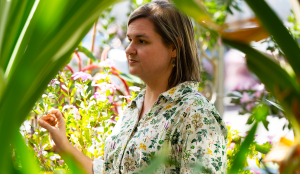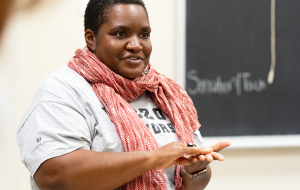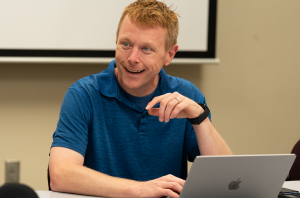Published on Oct. 16, 2024

Each year, the University of Missouri Honors College selects a One Read book that incoming Honors students engage with in a variety of ways. Along with a symposium – where students have the opportunity to interact with the author of that year’s text – students can dive further into the selected book through the Extended One Read course.
While several Honors students have the chance to take the class, the Honors College developed the Tarkow Teaching Fellows program late last year to allow for more students to partake in the in-depth discussions that the course offers.
The program is named in honor of Ted Tarkow, a professor emeritus of classical studies, who is still very active within the Honors College, including teaching a section of the Extended One Read course. Currently an affiliate faculty member, Tarkow served as director of the Honors College for a handful of years and has been a regular professor in the Humanities Sequence.
The Tarkow Teaching Fellows are funded, in part, through an endowed gift in honor of Ted and Marjorie Tarkow. The program is coordinated by Maya Gibson, an assistant teaching professor of women’s and gender studies in the Honors College.
“When I speak with Honors alumni across the country, some of the most enduring memories they describe are the small seminar-style courses where they discussed, dissected, and debated topics with their classmates and developed lasting connections with their professor,” said Catherine Rymph, dean of the Honors College. “We wanted to make that opportunity available to more students and to honor Ted Tarkow, who is truly a master teacher and forged enduring bonds with his students.”
Tarkow Teaching Fellows serve a two-year term and teach two sections of the Extended One Read course during the fall semester. Fellows also participate in collaborative planning and execution of the course with the cohort and Honors faculty leading up to and during the fall semester.
The first cohort of Tarkow Teaching Fellows – Amanda Durbak, Les Gray and Chris Josey – were named earlier this year and are currently sharing their expertise with Honors students through the Extended One Read course.
“We’re thrilled to bring in this first group of Teaching Fellows,” Rymph said. “They are all experts in their respective fields, and I know they are bringing outstanding perspectives to this course. It has been exciting to brainstorm with them and increase our academic offerings to Honors students.”
The Honors College rotates between a fiction and non-fiction book each year. This year’s One Read is Solito, a memoir that chronicles author Javier Zamora’s 3,000-mile journey from his small town in El Salvador, through Guatemala and Mexico, and across the U.S. border.
Amanda Durbak – Associate Teaching Professor of Biological Sciences
“What I love is that as a Tarkow Teaching Fellow we all have our own perspectives and expertise, and we’ve all been given the freedom to share those through this incredible text. I think it’s really powerful to show that anyone can approach this material and get something out of it; you don’t have to be in a certain discipline to teach this course.”
With research interests in plant molecular genetics and development, Durbak’s teaching is centered on both genetics and cell biology – a far cry from her focus with the Extended One Read course sections.
“I’m out of my comfort zone a bit, which isn’t a bad thing at all,” Durbak said. “I think it actually allows me to relate to my students, who may feel a little out of their comfort zones as students who are new to college life and talking about topics that they are a little unfamiliar with. We’re all in this together and having these exciting experiences with each other. I think that’s been really empowering for me.”

While the subject matter is different than what Durbak usually teaches, she has been able to incorporate plant-related sessions into her syllabus. Recently, for example, students toured Tucker Greenhouse, which includes a desert room, a cactus garden, and a tropical room with a pond, as well as additional growth space. The greenhouse currently holds between 500 and 800 species of plants.
The experience was a unique one, in that it allowed students to interact with plants that a 9-year-old Zamora could have encountered during his travels to the United States.
“The desert space in the Tucker Greenhouse offered students the opportunity to use their senses and kind of put themselves in Javier’s shoes,” Durbak said. “I had them walk around the entire greenhouse, too, to have them identify plants or spaces that they connected with. It was really an exercise about trying to put yourself in someone else’s shoes and attempting to understand an experience that is different than your own.”
Along with reading Solito, Durbak is introducing a variety of reading excerpts from various sources. She took a poll of the students early in the semester to see what type of topics they would like to cover. Durbak has matched those answers to additional readings.
“I’ve put a big focus on specific topics of interest,” Durbak said. “We’ve dove into different articles and chapters from other books to drive discussions. It all circles back to Solito, too, which is such an incredible memoir that has allowed us to really talk about important topics.”
Durbak added that she’s excited to see the Honors College expand the Extended One Read course offerings. She said courses of that nature are what makes the Honors College experience so unique for students.
“Something that my students have mentioned a lot is they really want to improve their writing,” Durbak said. “It’s so hard to work on that in a meaningful way in a larger class. This style of course is the perfect setting to work on those types of skills and get solid feedback from their peers. Students in these courses are also interacting with peers from a variety of degree programs and focus areas. Their common experience and what brings them together is the Honors College, which is really cool. It breaks down barriers and shows how unifying the Honors College is across campus.”
“Having a smaller class makes it easier to have in-depth conversations about the subjects being discussed,” added Tyra Gipson, a sophomore secondary education major who is in one of Durbak’s section of the course. “We also get more creative freedom for how assignments go. Dr. Durback lets us explore our personal learning styles due to the smaller class size.”
Les Gray – Assistant Professor of Theatre
“This is my first experience teaching in the Honors College, and it’s been so affirming to be invited to bring my expertise to the Extended One Read course. It’s incredible to be able to enrich the student experience in this way. Having that trust to share our background and experiences with students is exciting and rewarding.”
Gray said one of the first things they noticed about students in their Extended One Read course sections was a strong desire to engage with the text and each other.
“They blow my mind nearly every single class period,” Gray said. “The ambition, the thoughtfulness – they’re just so prepared and ready to learn. You can throw something at them, and they jump right in. Even if I’m not quite sure how a certain topic or activity will connect, these students are ready for it. It’s the perfect example of true academia.”
Gray has made sure to bring their research focus and passion for theatre and performance into their course, centered around the Solito text.

“The students have been very, very generous and so vulnerable,” Gray said. “From the beginning, I told them that I would invite them to participate – I’ll never demand that they share. I mainly want each student to reflect on the topics and themes that we’re discussing, and they’ve been so willing to do that.”
Like Durbak, Gray has introduced several different types of additional readings to compliment Solito. They have listened to a handful of podcasts, too. To add to those discussions – and to lean into Gray’s expertise – students have been up and active. For example, during a recent class period, Gray brought in a red ball. Students took turns passing the ball around and sharing their observations related to the ball. Gray brought the conversation back around to how Zamora was so descriptive throughout Solito.
“I wanted to find as many different entry points and modalities as possible to explore everything we’re talking about,” Gray said. “And while it’s been a lot of work to bring that all together, it’s offered me the opportunity to do my own exploration. I’ve tried to put myself in the shoes of a college freshman to see what would be useful to them in terms of conversations. It’s been such a fun experience.”
As an assistant professor of theatre, Gray said they love the opportunities that small class sizes offer, which is why they have connected with the Extended One Read course in such a meaningful way.
“On the first day of class, we talked about how big some of their other classes are,” Gray said. “I forget how large some of those classes truly are, so it’s nice to have these courses, where students can learn each other’s names and pronouns and form some bonds. I think the opportunity to be in these small, in-depth discussions and have that academic and intellectual intimacy is vital. I’m very appreciative for the opportunity to be part of it, and I think the Honors College trying to offer this experience to more students is amazing.”
Chris Josey – Associate Teaching Professor of Communication
“This is my second time with the Extended One Read course. Frankly, I love it! The flexibility is freeing. The interaction with students is compelling. I feel honored, in a way, that the Tarkow Teaching Fellows position allows me to watch these young minds grow and experience their first term at MU. Honestly, it makes me feel like I’m a college freshman all over, seeing Columbia through their eyes.”
Josey has interacted with Honors College students for several years, including students in the Extended One Read course.
“Rewarding is one word I would use to describe the Extended One Read teaching experience,” said Josey, who also serves as a faculty lead for one of the five ASH Scholars research teams. “More importantly, refreshing is another I would use. It is refreshing and rewarding to meet weekly with 10 bright and eager undergraduates. In my normal teaching load, I have very experienced and seasoned Honors students. So, it is great to dive into a single topic with a small group of eager and bright students.”

Josey paired Solito with another memoir – First Gen: A Memoir, written by Alejandra Campoverdi. The book follows Campoverdi as she shares her trajectory as a Mexican American woman raised by an immigrant single mother in Los Angeles.
“Alejandra Campoverdi self describes as a ‘first and only’ – a first generation migrant and only child,” Josey said. “Her experiences, I think, complete the story of immigration to include what happens next. As she rises from a gang member’s girlfriend to Ivy League graduate and White House aide, we see the struggles her new life brings to relationships tied to her ‘first and only’ status.
“I think it’s important to see a more complete picture of this very important topic. Certainly, the journey is important. Equally important are the experiences of these individuals and their children as they reside with the U.S. I think tracking and documenting both sides provides an empathetic and vivid picture of the experience.”
Josey allows students in his Extended One Read course sections to lead several of the discussions. Students ask questions to the entire group, creating an opportunity for meaningful back-and-forth dialogue.
“The smaller class sizes of courses like the Extended One Read or Honors Tutorials foster a deep sense of community in your academic experience, which is very much needed at such a large university like Mizzou,” said Jacob Hicks, a freshman plant sciences major. “These small class sizes foster deep conversations and one-on-one connections that cannot be found in large lectures. In addition, it offers every student a means by which they can really know their professor. In my One Read, for example, Dr. Josey opens every class by asking us how we are doing, and we usually talk about Mizzou sports or food. Through these conversations, I have been able to learn a lot more about Dr. Josey as well as share more of myself than I would in a large class setting.”
Like the rest of the inaugural Tarkow Teaching Fellow cohort, Josey said the Extended One Read course is an incredible offering for incoming Honors students.
“To be honest, I wish students across campus had this sort of experience,” Josey said. “I think having a shared academic experience focused on honing the leadership and academic skills MU values is so beneficial to a student’s time at college. For our Honors students, it gives them extended time to flex their brain power and really get to know one another through many high-impact practices. These experiences will be the ones they recall years down the road. I have no doubt that many of their classmates will be lifelong friends as well.”